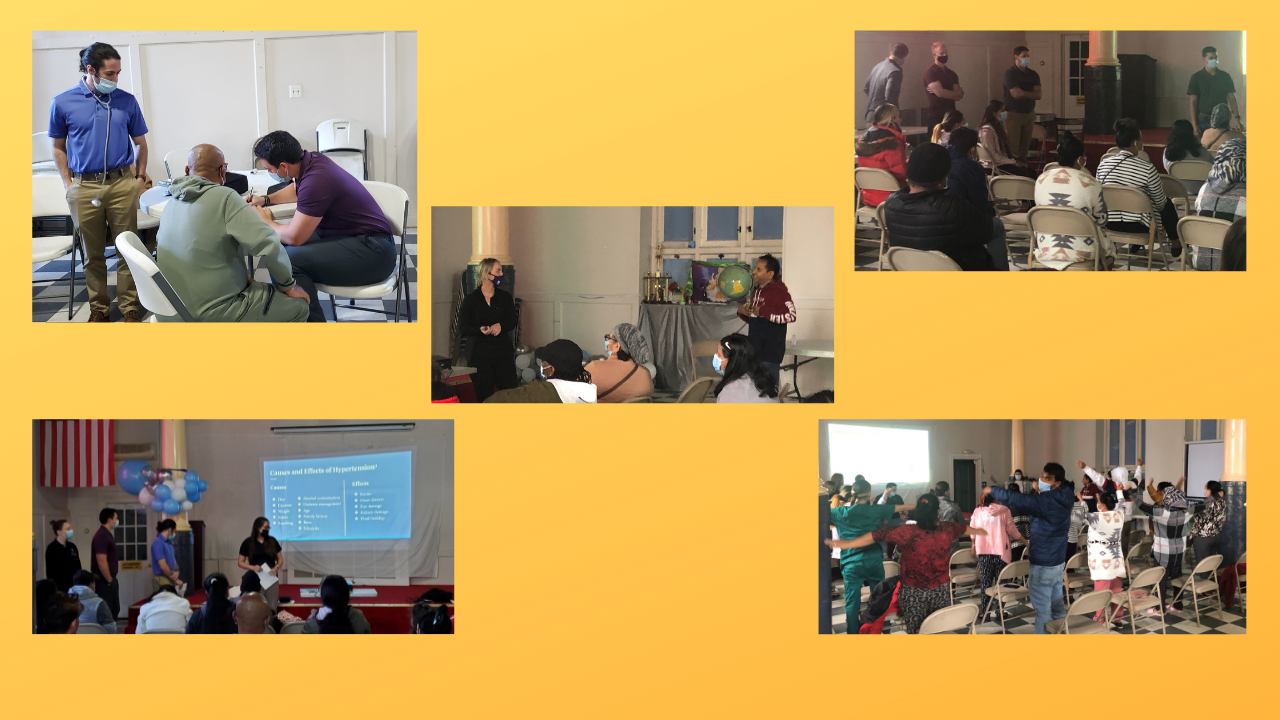University Works to Support Refugee Communities in Scranton

The University of Scranton’s ongoing efforts to support and welcome refugee communities in Scranton continued this fall semester, including providing and partnering on informational programming in relation to housing and health topics and in ways that offer connections to the refugee communities that now call Scranton home.
Professor of Physical Therapy, Dr. Lori Walton, Ph.D., DPT, MScPT, MPH(s), and her students in PT743 Psychosocial Aspects of Disability in Physical Therapy undertook a semester-long Community-Based Learning (CBL) project to provide health workshops to the Bhutanese refugee community in Scranton. Before engaging in this project, Dr. Walton first provided several training sessions for the students on how to improve access to care and health equity; appropriate, effective, and equitable work with culturally diverse populations and language translators; and working with newly resettled Americans with hearing and visual impairment.
Dr. Walton’s students also learned more about local resources and vulnerable populations, as well as the historical background of the Bhutanese refugee community, with class visits from Julie Schumacher Cohen, AVP for Community Engagement and Government Affairs and CBL Board Chair and Mr. Chandra Sitaula, from the Bhutanese Cultural Foundation of Scranton Association. Mr. Sitaula spoke with students in preparation for their presentations at the Bhutanese Cultural Community Center in South Scranton, particularly focusing on culturally appropriate communication. Mr. Sitaula and the Bhutanese community collaborated with Dr. Walton and her students to identify mutually agreed upon topics that aligned with the course information and student expertise and that would also be valuable to the Bhutanese community members in Scranton.
"We are so honored to have the opportunity to work with Mr. Chandra Sitaula at the Bhutanese Community Center to develop a partnership for promoting health and wellness in the community. Working together to help one another, embracing diverse human interaction and dialogue, and getting to know our neighbors in the Scranton Community was an honor that we continue to cherish with deep gratitude. This community-based experience with the Bhutanese Community was truly transformational for both faculty and students!" said Dr. Lori Walton, Ph.D., DPT, MScPT, MPH(s), Professor of Physical Therapy.
Dr. Walton’s 3rd year Doctor of Physical Therapy Program, along with the support of second-year Graduate Assistants, completed two different two-hour sessions to the Bhutanese Community Center on Oct. 27 and Nov. 8 with the assistance of Mr. Sitaula's translation of presentations into Nepali. Presentations included: “Nutrition and Physical Activity for People with Diagnosis Diabetes Mellitus II”; "Preventing High Blood Pressure"; and "Reducing Stress and Increasing Resiliency through Physical Activity.”
Reflecting on their experiences Nicholas Capobianco, SPT, Graduate Teaching Assistant; James Curley, SPT; Bryan Gorczyca; and Dan Passafiume shared the deep impact and inspiration that this experience provided them as they prepare for their profession:
“To be welcomed into the Bhutanese Community Center (BCC) as a guest presenter this semester reminded me and my peers how important it is to connect with our diverse local population. As third-year physical therapy students, we understand that it is our social and professional responsibility to use our health literacy to teach and advocate for people who may not have the same background. Yet, our experience at the BCC gave us a glimpse of what this actually looks like in practice. All of the benefits — cultural immersion, education, healthy changes — occur with persistence, patience, an honest narrative, and commitment to understanding rather than just periodic visits, posters, and statistics. While it was rewarding to share information with new friends and be thanked on our way out, the real value of our visit was humbly realizing that it was just a start. In our future as healthcare professionals, it’s the relationships we will develop that will forge a lasting, positive impact.”
Dr. Walton’s students also provided hands-on assistance to members of the Bhutanese community during the events by providing blood pressure screenings and demonstrations on how to use at-home blood pressure cuffs. Additionally, the students submitted 40 original health education handouts on various public health physical therapy-related topics, to be translated into Nepali, for the community.
In addition to the CBL project, the University is also partnering with NeighborWorks NEPA and Congolese refugee community leader and University student, Ushu Mukelo, to offer a series of workshops to the Congolese community focused on different issues in relation to housing, especially relevant as this community looks to purchase homes or find stable and affordable rental properties. The three-part series that is taking place in December 2021 and January 2022 will offer informational presentations on topics related to: mortgage loans and public assistance, housing quality, and understanding housing rights with Neighborworks and other community partners providing up to date and relevant information that will be translated by Mr. Mukelo into Swahili.
“As we see with this fall’s projects, health and wellbeing, language access, and affordable housing are salient issues for both the Bhutanese and Congolese refugee communities in Scranton. We are proud of our students and honored to partner with refugee community leaders and community partners to help provide relevant resources. To work with and accompany these communities – individuals and families who have had to flee situations of violence, extreme poverty and other traumas – is a source of mutual learning and directly ties to our mission as a Jesuit and Catholic institution,” said Julie Schumacher Cohen.
As we all work together to form a more equitable and inclusive community in Scranton, the University is deeply appreciative for all that our refugee communities bring to this city and plans to continue its engagement and efforts in alignment with the University’s mission and strategic plan’s focus on partnerships for the common good.






